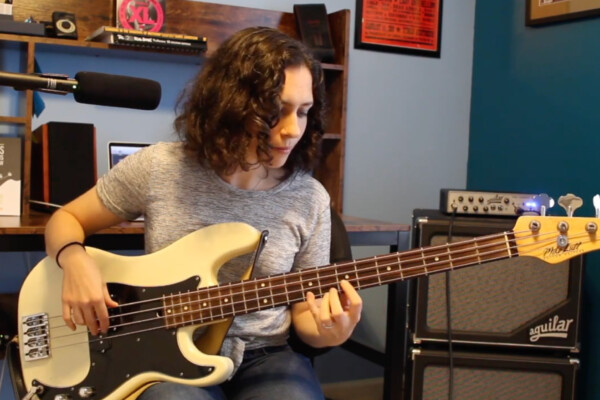Should I Be Afraid of Breaking the Rules of Harmony When Composing?

Q: I have been playing bass for others for years but when it comes to writing my own music I constantly question myself about the rules. I understand if it sounds good play it but, “what key could this be and, can I play a dominant 7 here, and will it still be in a key?” (In the musical rulebook) When playing diatonic, is it okay to change the extended voicing and does that change the key? This seems to be one of my biggest questions. And something that appears to be holding me back.
A: I have a confession to make: Unless it’s a pop tune or a blues tune in one key throughout, I almost never think about what key a tune is in. Rather, I pay attention to harmonic motion and how one chord is connected to the next, and the next, and the next…
There really is no need to worry about whether the chord you want to proceed another is in the key or not. In fact, it may be more interesting harmonically if the chords stretch outside of the key (assuming things make sense to the ear and resolve well).
I very much use my ears and listen to the harmonic gravity of one chord to the next. ie: what notes in the chord want to go where. How does it want to resolve? I don’t really care what key a chord is or isn’t in. I only care that there is a fluidity to the chordal progression and that it resolves well. If I like the way it sounds, it works, in my book.
Now, I will say that the more you understand harmony and the way chords interact with each other, the easier (or quicker) it may be for you to come up with interesting progressions. I would study the harmonic movement of tunes that resonate with you. Pay attention to any harmonic devices such as chordal parallel motion (consecutive intervals), tri-tone substitutions, V7-I cadences, transposition, temporary tonic shifting (tonic-isation).
You could write a tune full of nothing but -11 chords with the roots of those -11 chords moving in minor 3rds and it could work! What matters is the sum of its parts. Tonality is only one aspect of a song and unless you’re a singer, likely one of the least important. Time-feel, tempo and, most importantly, the melody will play a huge role in whether it “works” or not.
I have to stress again that the more you know the rules, the easier it is to break them successfully. I’m mostly self-taught when it comes to harmony, although I asked plenty of questions when surrounded by musicians who understood more than I did. I frequently took lessons from pianists and guitarists in an attempt to understand things from their perspective but much of the actual understanding of the concepts (or any rules) came from reading books and agonizing over music in the shed. Initially, I broke the rules because I didn’t know them. Now, I more successfully break them because I understand them and feel confident in how to weave in and out of any pre-determined harmonic “rules.”
Remember that people played music before they analyzed the relationships of the chords. Your ears are the biggest asset in your arsenal. Don’t get too hung up on what is correct but come at it from the other side. Find what you like and then try to understand why it works. I find that the study of harmony and the mindful practice of how to employ that knowledge is incredibly helpful, but it’s also important to let your mind operate freely and not get too hung up on what is proper or jazz-school-approved.
I’m very curious to hear what others have to say about this because, although I have a strong understanding of chord scales and how to navigate changes, I’ve always been hopefully lost when it comes to the academic analysis of changes. I can’t tell you which chords in a tune are subdominant this, moving to a V7 of V that but I can pretty well explain how to develop a variety of chord scales that will work over any chord in a tune and tell you how to practice navigating them in a musical way.
So, my jazz harmony brother and sisters… give us your two cents with regard to mindfully applying the rules of harmony and how you make those decisions when composing. Please share your thoughts in the comments.
Have a question for Damian Erskine? Send it to [email protected]. Check out Damian’s instructional books, Right Hand Drive and The Improviser’s Path.



